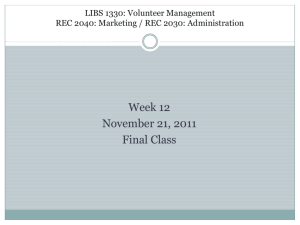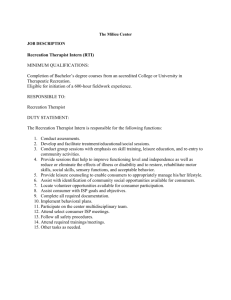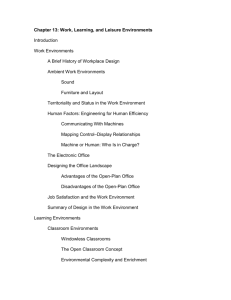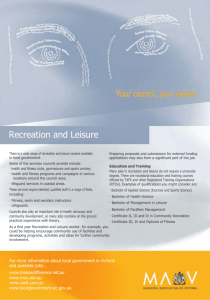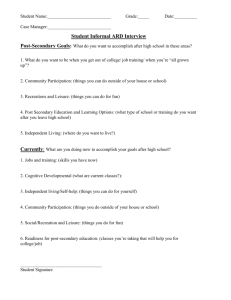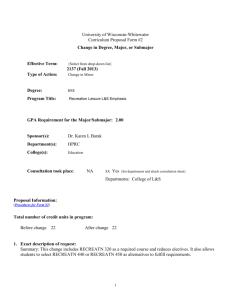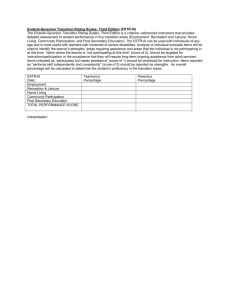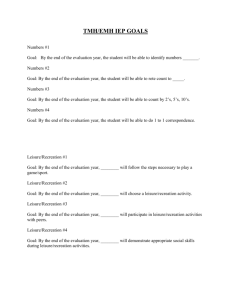Course Specific Student Learning Outcomes Data
advertisement
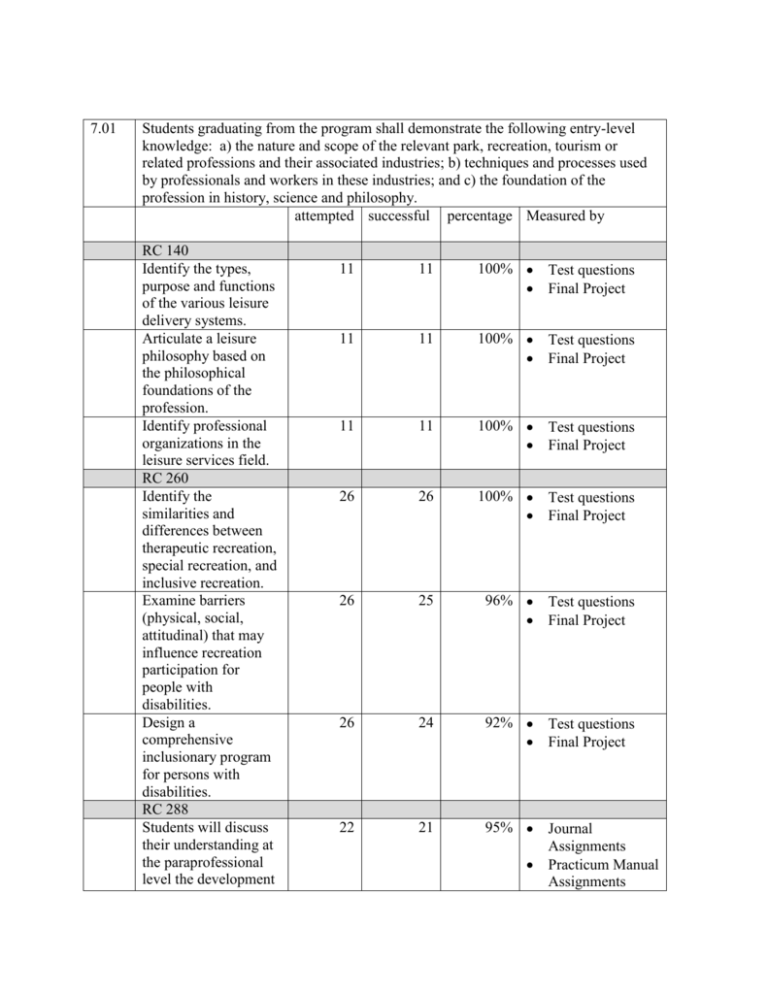
7.01 Students graduating from the program shall demonstrate the following entry-level knowledge: a) the nature and scope of the relevant park, recreation, tourism or related professions and their associated industries; b) techniques and processes used by professionals and workers in these industries; and c) the foundation of the profession in history, science and philosophy. attempted successful percentage Measured by RC 140 Identify the types, purpose and functions of the various leisure delivery systems. Articulate a leisure philosophy based on the philosophical foundations of the profession. Identify professional organizations in the leisure services field. RC 260 Identify the similarities and differences between therapeutic recreation, special recreation, and inclusive recreation. Examine barriers (physical, social, attitudinal) that may influence recreation participation for people with disabilities. Design a comprehensive inclusionary program for persons with disabilities. RC 288 Students will discuss their understanding at the paraprofessional level the development 11 11 100% Test questions Final Project 11 11 100% Test questions Final Project 11 11 100% Test questions Final Project 26 26 100% Test questions Final Project 26 25 96% Test questions Final Project 26 24 92% Test questions Final Project 22 21 95% Journal Assignments Practicum Manual Assignments and performance of specific agency programs. Students will understand leisure service organizations and programs including specifically: a) administrative structures b) programming applications c) leader/manager characteristics 7.02 22 21 95% Fieldwork Experience Seminar Involvement Students will be able 22 21 95% Course to use written Assignments communication skills Professional related to professional Resume’ and correspondence, Cover Letter resume writing, and cover letters. Students graduating from the program shall be able to demonstrate the ability to design, implement, and evaluate services that facilitate targeted human experiences and that embrace personal and cultural dimensions of diversity RC 100 Students will be able 82 74 90% Test Questions to articulate the impact Written Paper of diversity on leisure. Students will analyze 81 73 90% Test Questions sociological and Written Paper psychological perspectives of leisure as they apply to individuals and groups. Students will analyze trends in contemporary American society that are related to leisure. RC 220 Apply effective leadership techniques in conducting 75 71 95% Test Questions Written Paper 12 12 100% Test Questions Practice Activity Leadership Leadership Evaluations appropriate activities for diverse age groups and diverse demographic populations. Implement safety and risk management functions to protect participants and facilitators. Demonstrate techniques for managing conflict and motivating participants. RC 380 Develop goals and objectives of recreation programs. Utilize program planning/design processes. Develop procedures and techniques for assessment of recreation programs. RC 440 Students will be able to assess leadership styles and their application in developmental settings. Students will be able to assess group needs and design experiences based on goals and objectives. Students will design and facilitate experiential activities to foster development of teamwork, cohesiveness, and synergy. 12 12 100% Test Questions Practice Activity Leadership 12 12 100% Practice Activity Leadership 23 23 100% Class activities and assignments 23 23 100% Test Questions 23 19 83% Test Questions 16 15 94% Facilitation Assignments Final Course Project 16 15 16 15 94% Group Dynamics/Needs Assessment Facilitation Assignments 94% Challenge Course Facilitation Assignment Facilitation Assignments 7.03 Students graduating from the program shall be able to demonstrate entry-level knowledge about operations and strategic management/administration in parks, recreation, tourism and/or related professions. RC 385 Develop a facility 16 16 100% Final Project design and operation plan for a new recreational facility. Identify risks of a 16 13 81% Site Visit and recreational facility Facility and recommend Evaluation approaches to deal assignment with the identified risks. Identify regulatory 16 13 81% Final Project agencies and standards affecting the functional design and management of recreational facilities. RC 405 Students will be able 19 19 100% Site Visit to identify & discuss Reflection Papers various environmental, political, economic, and social trends/issues unfolding in society. Students will 19 19 100% Current demonstrate through Trends/Issues oral presentation and Predication written materials Presentation and knowledge relative to Paper Assignment current trends and problems in recreation and leisure. Students will be able 19 19 100% Article Review to assess issues Assignment affecting the various Site Visit Issue agencies within the Paper recreation and leisure field and describe/discuss the factors involved within such issues. RC 420 Create policies and procedures appropriate to various recreation and leisure settings. 25 25 100% Apply techniques and strategies for human resource management, agency marketing, risk management and budget administration Understand principles of risk management and safety relating to the provision of leisure services. 7.04 25 25 100% 25 25 100% Tests Problem Based Learning Exercises Final Application Project Tests Problem Based Learning Exercises Final Application Project Tests Problem Based Learning Exercises Final Application Project RC 497 http://www.semo.edu/ hhs/images/HHPR_inter nship_manual_HM.pdf Supervisor’s evaluation Student’s weekly reports Exit Survey
